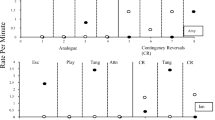Abstract
An earlier, intensive, summer project resulted in an effective therapy program for autistic children. The only assistance for continuing the program during die academic term was from four undergraduates skilled in operant conditioning (each available for two hours per week) and undergraduates enrolled in the authors’ courses. Under these conditions, a program was developed that maintained daily therapy sessions with autistic children, while giving training to inexperienced undergraduates. Data pertaining to the effectiveness of the daily therapy sessions and the training of the undergraduates are presented, and variables thought to be important to the success of the program are discussed.
Similar content being viewed by others
References
AYLLON, T. 1963. Intensive treatment of psychotic behavior by stimulus satiation and food reinforcement. Behaviour Research and Therapy, 1, 53–61.
AYLLON, T. 1967. A behaviorial approach to the manpower problem in mental health. Paper read at the American Psychological Association, Washington, D.C.
AYLLON, T., & AZRIN, N. 1968. The token economy. New York: Appleton-Century-Crofts.
BARRETT, B. H. 1962. Reduction in rate of multiple tics by free operant conditioning methods. Journal of Nervous and Mental Disorders, 135, 187–195.
FERSTER, C. B., & PERROTT, M. C. 1968. Behavior principles. New York: Appleton-Century-Crofts.
GOLDIAMOND, I. 1966. Self-control procedures in personal behavior problems. In R. Ulrich, T. Stachnik, & J. Mabry (Eds.), Control of human behavior, Glenview: Scott, Foresman.
KELLER, F. S. 1968. Goodbye teacher. Journal of Applied Behavior Analysis, 1, 79–89.
LOVAAS, O. I., FRIETAS, L., NELSON, K., & WHALEN, C., 1967. The establishment of imitation and its use for the development of complex behavior in schizophrenic children. Behaviour Research and Therapy, 5, 171–181.
MARTIN G. L., ENGLAND, E., KAPROWY, E., KILGOUR, K., & PILEK, V. 1968. Operant conditioning of kindergarten-class behavior in autistic children. Behaviour Research and Therapy, 6, 281–294.
MARTIN, G. L., & PEAR, J. J. 1969. An ongoing operant conditioning program with autistic children. Manitoba Psychologist, 10, 9–18.
MICHAEL, J. 1963. Laboratory studies in operant behavior. New York: McGraw-Hill.
RISLEY, T., & WOLF, M. 1967. Establishing functional speech in echolalic children. Behaviom Research and Therapy, 5, 73–88.
SKINNER, B. F. 1953. Science and human behavior. New York: Macmillan.
ULRICH, R., STACHNIK, T., & MABRY, J. (Eds.) 1966. Control of human behavior. Glenview: Scott, Foresman.
VERHAVE, T. (Ed.) 1966. The experimental analysis of behavior. New York: Appleton-Century-Crofts.
WATSON, L. S. 1967. Application of operant conditioning techniques to institutionalized severely and profoundly retarded children. Mental Retardation Abstracts. 4, (1), 1–18.
Author information
Authors and Affiliations
Additional information
This study took place at the Manitoba Training School, Portage la Prairie, Manitoba. Grateful acknowledgement is due to Dr. G. Lowther, Medical Superintendent, and the staff at this institution for their excellent co-operation. Special thanks go to the student supervisors: G. England, K. England, E. Kaprowy, and V. Pilek, who deserve much of the oredit for the success of the program. Preparation of this paper was supported in part from the University of Manitoba Graduate Research Fund and from a Canadian Medical Research Council Grant No. Ma 3636.
This paper was first presented at the Alnerican Psychological Association convention, San Francisco, California, 1968.
Rights and permissions
About this article
Cite this article
Martin, G.L., Pear, J.J. Short Term Participation by 130 Undergraduates as Operant Conditioners in an Ongoing Project With Autistic Children. Psychol Rec 20, 327–336 (1970). https://doi.org/10.1007/BF03393949
Published:
Issue Date:
DOI: https://doi.org/10.1007/BF03393949




